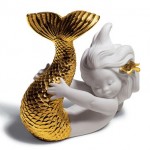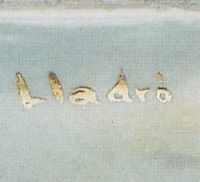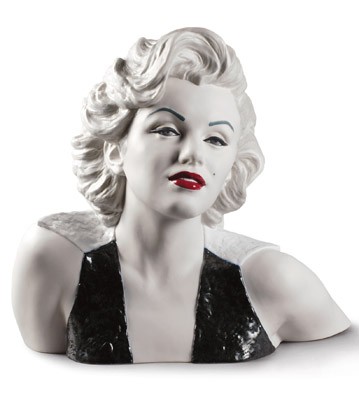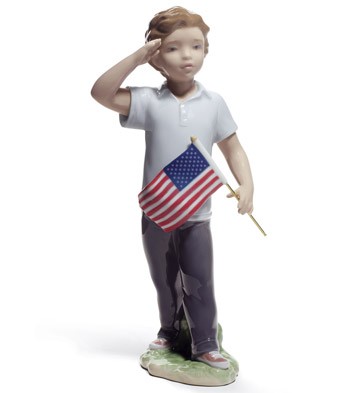
Lladró porcelain figurines are delicate, detailed, handmade statuettes created in Valencia, Spain. They range from smaller, simpler pieces, to large and complex designs. Lladró porcelain is known for its high quality and excellent workmanship. Each item is crafted by hand and designs usually illustrate life’s precious moments. The company offers limited editions aimed specifically at the collector’s market, but has added other decorative items and fixtures for the home to its range in recent years.
The History of Lladró Porcelain Figurines
Lladró was established in 1953 by three brothers from Almàssera, Spain. Jose, Juan, and Vicente Lladró opened the first retail store in nearby Valencia in 1955, with their first factory following in 1958. The factory was opened near Tavernes Blanques, Valencia, but later moved to Tavernes Blanques. Today, the factory covers a million square feet. Known as “The Porcelain City,” the complex contains a Lladró museum as well as The Professional Training School. The brothers established the training school in 1962 to teach artists the skills they need to create and produce the figurines sold by the company.
Information on Lladró figurines and collectibles is available from guides and from the company’s website, which lists older, retired pieces for reference purposes. Pieces are available from authorized retailers and secondary market sources like estate sales, auctions, second hand shops, and online auction sites like eBay.
Finishes Used in Lladró Figurines
Lladró figurines come in three finishes: glazed, matte, and gres.
Glazed
Glazed figurines have a glossy finish, and are most popular with collectors.
Matte
Matte figurines are unglazed. They are either painted or completely white, also known as bisque. Due to the unreliability of sales in this variation, many matte pieces were retired in 1991. Today, only the most popular pieces are available in both glazed and matte finishes.
Gres
Gres figurines are made from a different type of porcelain and have been available since 1970. Terra toned pigments were added to these pieces, giving the finished product a look that is closer to pottery and stoneware. Some pieces are varnished before firing, giving them a glazed look.
Lladró Collections and Themes
When researching and collecting Lladró collectibles, one can search by collection or by theme.
Collections
Over the years, Lladró has created a number of collections, some of which have been retired.
• Capricho: These lacy, delicate pieces were created and sold between 1983 and 1991. The collection was retired because pieces were damaged too easily during shipping.
• Elite Limited Editions : This collection first became available in 1974. It features larger, more technically complex pieces with more elaborate details.
• Goyesca : These figurines were inspired by Spanish artist Francisco Goya, and designed by Enrique San Isidro. All pieces were limited editions, and all sold out. They are fairly rare finds in the secondary market.
• Lladró Society Members : The Lladró Society refers to the Lladró collectors club. Pieces were available only to club members, from 1985 to 2000.
• Privilege : Lladró Society pieces were replaced by the Privilege Collection. These pieces were made from 2001 to 2010. This has evolved into the Lladró Gold Club, an invitation-only club restricted to collectors who spend more than a certain amount of money on Lladró products each year.
• Black Legacy : This collection was designed to celebrate African-American culture. Initially called “Black Heritage,” the name was changed to “Black Legacy” to be more politically correct.
• Christmas : Christmas items include tree toppers, nativity sets, bells, balls, ornaments, and figurines.
• Legend: This collection was introduced at the end of the 1990s, and features the “delicate and translucent texture of porcelain” coupled with the glimmer of gold and precious stones. The collection includes imaginary creatures, like fairies, elves, and little angels.
• Re-Cyclos: Introduced in 2005, this collection features new items from important designers. Designs are based on Lladró’s classical pieces.
Other collections include:
• Aura
• Movement
• Humanitas
• Klimt
• Season in Bloom
• My Family Album
• Lithophanes
• Talismania
• High Porcelain
• Classic Children’s Tales
Themes
Lladró themes are usually based on life moments, and focus strongly on love and relationships between loved ones, like mothers, fathers, and children, or men and women. Although most collections are focused primarily on human figurines, many portray animals like dogs and cats . However, some ranges feature stand alone animals . The most popular of these depict dogs and cats, but some figurines of horses, ducks, swans, chicks, doves, bison, rabbits, bears, elephants, cows, and owls are available. Flowers are included in many designs and are offered as stand-alone pieces. Each petal is individually made, making every piece unique.
Other themes include:
• Angels
• Sports and Professions
• Men, women, and children
• Fantasy
• Spain and Traditions
• Religion, including Christianity, Judaism, Buddhism, and Hinduism
• Christmas
Other Lladró Collectibles and Products
Although Lladró is most famous for its figurines, the company also produces lighting, mirrors, vases, fragrances, jewelry accessories, table-top art (L’Art de la Table), bathroom accessories, and decorative items. Decorative items include pieces like eggs, bells, candle holders, boxes, collector plates, bowls, bookends, paperweights, and clocks .
Lladró Porcelain Maker’s Marks
Lladró porcelain marks are listed in full on the company’s website. As with most companies, early works may be without markings. Items were initially marked with “Lladró” impressed into the bottom. When the company started exporting items to the United States and Canada in 1965, “Spain” was added. As a result, items produced between 1960 and 1965 were commonly marked “Lladró Espana” or “Lladró Made in Spain.”
The blue flower mark seen on modern pieces came into being around 1970. The flower is a stylized combination of the Spanish campanillo, or bellflower, and an ancient alchemical symbol. It reflects the marriage of art and science evident in Lladró products. Items were marked with the flower above “Lladró.” The first stamp was missing the accent on the last letter of the name, and this was corrected in 1974. In 1977, the mark was again changed to include the copyright symbol and the acronym DAISA, the name of the Lladró company that holds the intellectual property right to the Lladró range.
In 1984 the mark was changed again to incorporate the copyright date and the four-digit model number. In 1990, the typeface was updated and the LFH number added. This number is unique to each piece and is related to Lladró’s Assurance Program. The company insures each piece at no extra cost. If a piece breaks, one can buy the same one at a 33% discount, provided it is part of the current catalogue and in stock. If the piece has been sold out or retired, one can buy a piece of equal or lower value. This system is dependent on the registration of each piece, either through the retailer or through the company’s site.
Choosing Lladró Collectibles
When choosing Lladró collectibles, doing adequate research about pieces and current market values is essential. Learning more about each piece adds value for some collectors. If one chooses to buy pieces on the secondary market, it is important to check pieces for blemishes and damage, including cracks or chips in the glaze and bodies of each item. Some prefer collecting items purely for their beauty, while others collect for investment. Whatever one’s reasons for collecting, items should have some personal appeal.
Finding Lladró Collectibles
Lladró Collectibles are listed in eBay’s Decorative Collectible Brands section, a subcategory in the Decorative Collectibles section. Don’t forget to search eBay stores to see what is available from stores. If you do not see the item you want in the listings, creating a post in Want it Now will let sellers know what you are looking for. Alternatively, saving a search will trigger an automated email notification if the item becomes available.
Stay Safe
eBay has a number of policies in place to protect the community. Moving a sale off eBay means that you are no longer protected. eBay’s collaboration with PayPal offers a secure, convenient way to pay. Never use instant transfer methods to pay for an item if you don’t know the seller. Although unlikely, if your item fails to arrive or is not as described, eBay Buyer Protection will refund your buying price and shipping fees.
Get to Know the Seller
Use the seller’s feedback score and comments to get an idea of the seller’s service and products. Don’t forget to check the number of sales completed. Carefully check the description and photos of the listing to get all the details. Use the “Ask a Question” link to ask the seller any questions you may have. You can ask that expensive or fragile items be insured before they are shipped.
Before You Buy
Remember to add the shipping and handling fees to the purchase price to work out the total cost. Items that are very fragile and vulnerable to damage may have higher packaging fees. Doing adequate research will give an accurate idea of an item’s market value.
Conclusion
Lladró collectibles feature items for every collector, whether one is looking for display pieces or an investment piece. One can search for items based on collections or themes, and pieces are available to decorate every room in the house.









Hi. Can you explain the nao brand on the bottom of my “lladro” ballerina lamp please?
We have posted information here to help explain the difference.
I came across a Lladro piece #4990. A Japanese girl with a fan, and flowers in her hair. The base when turned upside down is not white like all the other’s I have seen. Were they every painted or glazed grey/black to match her base that she is standing on? The artist marks are there, the stamp Lladro made in Spain is there and what looks like a digit stamp of 16 and some thing else ( I am not sure).
If all the bases are white, am I looking at a copy and not an authentic piece? Thank you kindly for responses.
are retired lladro pieces more valuabe
How can I find out the value of my Lladró pieces?
I am interested in selling a large lladro collect amongst other porcelain figures such as hummels.
What does M.C. Lladro
signature mean on bottom of figurines?